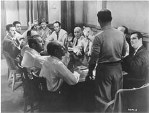There was a great debate this noon between our own Professor Paul Secunda and Dale Carpenter of Minnesota. The question before the house was the meaning of Lawrence v. Texas, a 2003 Supreme Court decision which struck down a state law prohibiting homosexual sodomy. Both Professors Secunda and Carpenter agree that the majority decision, written by Anthony Kennedy, was rather opaque (I regard this as kind), leaving us uncertain as to just what type of right it recognized and how similar claims might be assessed in the future.
In Professor Carpenter’s view, Lawrence should be read to recognize a fundamental right to sexual autonomy. State interference with this right should presumably be subject to strict scrutiny. Professor Secunda argues that Lawrence cannot be read in this way, but, instead, ought to be understood as a move away from strictly tiered scrutiny toward a balancing approach applying rational basis scrutiny with, I suppose, more or less “bite” depending upon the nature of the liberty interest infringed. It is my impression that the nature of this more “carniverous” form of review (I can’t help myself) would depend on some notion of what forms of human autonomy are most compelling and a regard for the need to protect discrete and insular minorities, a view that, for me, recalls John Hart Ely’s masterwork Democracy and Distrust.
Both Professors Secunda and Carpenter argued forcefully for their positions.
 At yesterday’s faculty workshop, Professor John Lovett of Loyola-New Orleans gave an eye-opening presentation on his latest scholarship, entitled “The Winding Road to Recovery: Observations on Property Relations Three Years After Hurricane Katrina.” Professor Lovett detailed the devastation to single-family and multi-family housing in New Orleans. He then explained how different governmental programs — responsible for billions of dollars earmarked for rebuilding and repopulation efforts — have failed or had limited success.
At yesterday’s faculty workshop, Professor John Lovett of Loyola-New Orleans gave an eye-opening presentation on his latest scholarship, entitled “The Winding Road to Recovery: Observations on Property Relations Three Years After Hurricane Katrina.” Professor Lovett detailed the devastation to single-family and multi-family housing in New Orleans. He then explained how different governmental programs — responsible for billions of dollars earmarked for rebuilding and repopulation efforts — have failed or had limited success. 
